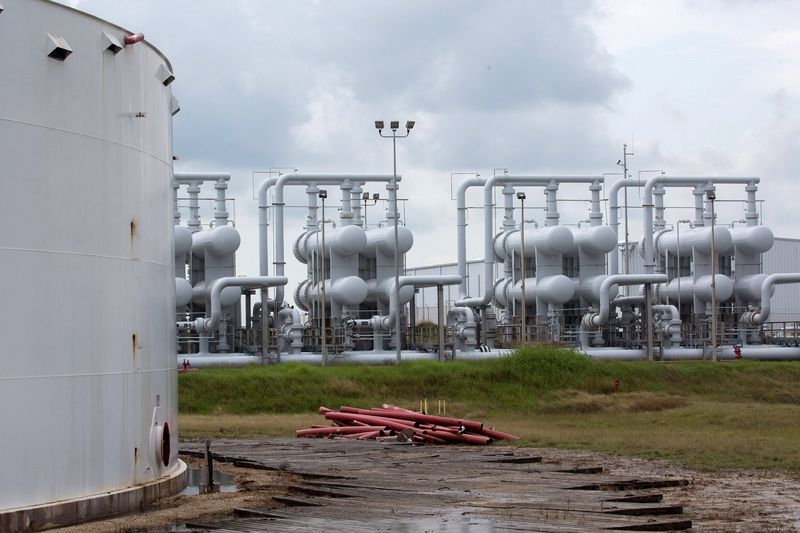
Factbox-Biden administration slowly replenishes emergency oil stash
Factbox-Biden administration slowly replenishes emergency oil stash By Reuters
Breaking News
‘;
Published Jan 30, 2024 12:02PM ET
Updated Jan 30, 2024 03:06PM ET
2/2
© Reuters. FILE PHOTO: An oil storage tank and crude oil pipeline equipment is seen during a tour by the Department of Energy at the Strategic Petroleum Reserve in Freeport, Texas, U.S. June 9, 2016. REUTERS/Richard Carson/File Photo
2/2
By Timothy Gardner
WASHINGTON (Reuters) – The administration of U.S. President Joe Biden is slowly putting oil back into the Strategic Petroleum Reserve, after selling a record amount from the emergency stockpile in 2022.
The Department of Energy said on Tuesday it hopes to purchase about 3 million barrels of domestically-produced sour crude oil for delivery in June, in its latest offer to oil companies.
Here are some facts about the SPR and efforts to replenish it.
WHAT IS THE SPR?
It is the world’s largest emergency oil stash. The U.S. created the SPR in 1975 after the Arab oil embargo spiked gasoline prices and damaged the economy. Presidents have tapped the stockpile to calm oil markets during war or when hurricanes hit oil infrastructure along the U.S. Gulf of Mexico. The oil is held in heavily-guarded underground caverns at four sites on the Texas and Louisiana coasts.
HOW MUCH SPR OIL WAS SOLD IN 2022?
In 2022, the administration announced a sale of 180 million barrels of crude oil over six months from the reserve, the largest ever SPR sale, in an effort to control fuel prices after Russia’s invasion of Ukraine. The Energy Department also conducted a sale of 38 million barrels in 2022 that had been mandated in laws passed by Congress.
HOW MUCH IS COMING BACK?
As of Jan. 19, the administration has bought back about 20.13 million barrels, of domestically produced crude oil.
It also has sped up by several months the return of nearly 4 million barrels to the SPR from loans to oil companies. The oil is expected to be returned by February instead of mid-year.
The pace of the buybacks is being tempered by planned life extension maintenance at two of the four SPR sites, department officials have said.
Quick buybacks of much larger volumes could also risk pushing up oil and gasoline prices ahead of the presidential election in November, analysts have said.
CURRENT SPR LEVEL
The reserve currently holds 357.4 million barrels, nearly 60% of which is sour crude, or relatively high sulfur oil which many U.S. refineries are engineered to process. The most oil it has ever held was nearly 727 million barrels in 2009.
The sales in 2022 sank the level of the SPR to the lowest in about 40 years, and even with the buybacks, the level is clinging to its lowest since late 1983.
That angered some Republicans who accused the Democratic administration of leaving the U.S. with a thin supply buffer to respond to a future crisis.
But the administration says it has a three-pronged strategy to return oil to the reserve. That includes buying back oil, the return of oil loaned from the SPR to companies, and its work with Congress to cancel congressionally mandated sales of 140 million barrels of SPR oil through 2027. Both Democratic and Republican lawmakers had voted for those sales to pay for government programs.
The U.S., which is producing oil at record volumes with more increases expected this year, also has more crude in the SPR than it is required to as a member of the Paris-based International Energy Agency, the West’s energy watchdog. Under the agreement, the U.S. is required to hold 90 days’ worth of net petroleum imports.
AT WHAT PRICE DOES THE U.S. WANT TO BUY OIL BACK?
The administration says it sold the 180 million barrels at an average of about $95 a barrel. It wants to buy back oil at $79 a barrel or less. The West Texas Intermediate oil price of about $77.75 a barrel on Tuesday allows such purchases. But prices could rise given the risk of the war in Gaza expanding to the greater Middle East and as some tankers divert course from the Red Sea following air strikes by the United States and Britain on Houthi targets in Yemen.
Factbox-Biden administration slowly replenishes emergency oil stash
Terms And Conditions
Privacy Policy
Risk Warning
Do not sell my personal information
© 2007-2024 Fusion Media Limited. All Rights Reserved.
Risk Disclosure: Trading in financial instruments and/or cryptocurrencies involves high risks including the risk of losing some, or all, of your investment amount, and may not be suitable for all investors. Prices of cryptocurrencies are extremely volatile and may be affected by external factors such as financial, regulatory or political events. Trading on margin increases the financial risks.Before deciding to trade in financial instrument or cryptocurrencies you should be fully informed of the risks and costs associated with trading the financial markets, carefully consider your investment objectives, level of experience, and risk appetite, and seek professional advice where needed.Fusion Media would like to remind you that the data contained in this website is not necessarily real-time nor accurate. The data and prices on the website are not necessarily provided by any market or exchange, but may be provided by market makers, and so prices may not be accurate and may differ from the actual price at any given market, meaning prices are indicative and not appropriate for trading purposes. Fusion Media and any provider of the data contained in this website will not accept liability for any loss or damage as a result of your trading, or your reliance on the information contained within this website.It is prohibited to use, store, reproduce, display, modify, transmit or distribute the data contained in this website without the explicit prior written permission of Fusion Media and/or the data provider. All intellectual property rights are reserved by the providers and/or the exchange providing the data contained in this website.Fusion Media may be compensated by the advertisers that appear on the website, based on your interaction with the advertisements or advertisers.

